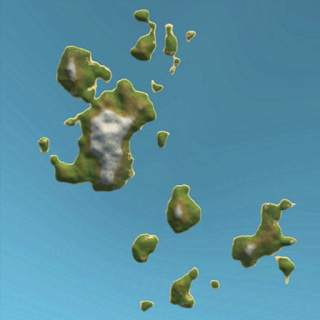Winds of Trade Dev Update #10

Lately I've been focused on deciding on a set of features I wanted to implement in order to make a 0.3 version of Winds of Trade. I am almost done with them, so I can send this new development release to some friends for testing. These are the latest changes made after the whole "add procedurally generated countries to the game" nightmare: Lots of tweaks to the terrain generation algorithm. Now it's a lot more "island-y", runs faster and crashes less. It's still not perfect, but it's a vast improvement over the previous version. An example map made with the new terrain generation algorithm. Added a basic macroeconomy simulation: countries go through different economic situations (like depression, recession, prosperity and so on) that change the rate at which they manufacture and demand different goods and the overall prices. For example, a country that's going through a depression phase will lower its coffee consumption; or a country tha...
